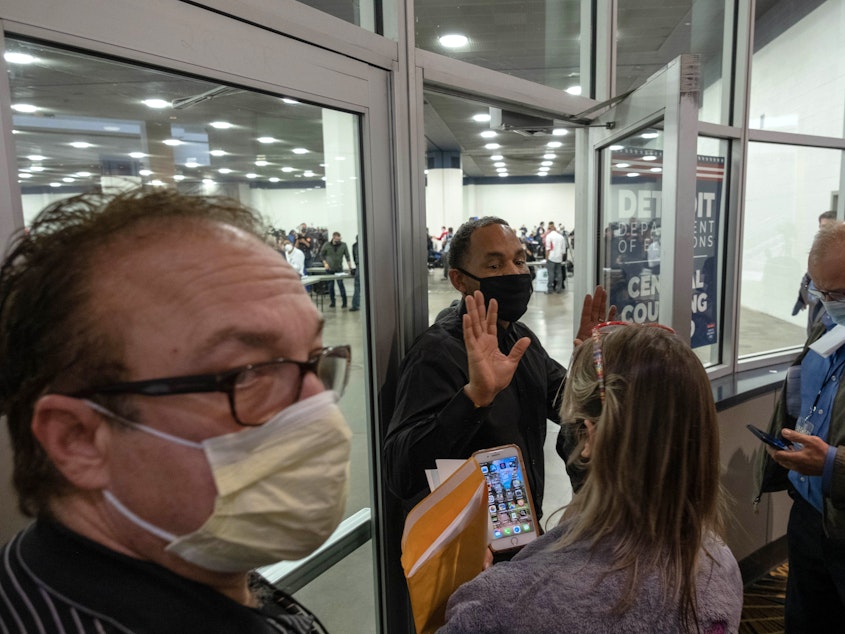Trump Launches Broad Legal Gambit Paired With Public Doubt-Raising On Results

President Trump's campaign has unleashed a multi-pronged legal offensive directed at states where vote-counting continued into Thursday based on unsupported allegations about fraud and irregularities in the election.
Updated at 12:09 p.m. ET
Lawyers for the Trump campaign sought intervention from the United States Supreme Court and also filed suit in Pennsylvania, Georgia and Nevada seeking remedies they hoped would help their prospects in those places. In some instances, that included requests for counting to cease altogether or at least pause for a time.
In Wisconsin, the campaign said Wednesday it would request a recount there after unofficial tallies showed Democrat Joe Biden leading Trump by about 20,000 votes. The Trump campaign alleged, with little evidence, irregularities in the vote. A recount can't begin until the state officially certifies the results, which are due by Dec. 1.
In particular, Republicans have complained that their observers and not being granted access close enough to observe the vote counting process and filed a flurry of lawsuits around the issue. In Nevada, a lawsuit objected to the state's decision earlier this year to send absentee ballots to all active voters.
Sponsored
Trump himself made his objective clear with posts on Twitter including one that sought to "STOP THE COUNT."
Learn more here about the states that remain undecided.
Little evidence for claims
Neither local government officials, international observers, news organizations or others have made any credible reports about widespread irregularities with voting practices through the election. Separately, some U.S. national security officials took victory laps claiming credit for what they called the relative smoothness and freedom of the process from cyber-harassment.
Mostly baseless allegations about "fraud," however, have been a leitmotif of Trump's and his camp since his inauguration. They continued through the campaign and now after Election Day itself in a bid to raise doubts about the validity of results expected in the coming days from key states.
Sponsored
Officials in Nevada and Georgia were expected to give updates in their progress counting large numbers of ballots that arrived within the limits set by those state laws. If one or both of those states award their electoral votes to Biden, that would push Biden's tally to the 270 necessary to win the presidency, according to the tally of Electoral College votes maintained by the Associated Press.
Trump's objective was to slow the process as much as possible in the key states and, meanwhile, to continue casting doubt on the results. Trump supporters appeared to plan rallies in Philadelphia, Detroit, Phoenix and Atlanta branded as "Protect the Vote," premised upon opposing some kind of malfeasance in those places.
The campaign celebrated a ruling from a Pennsylvania court that allowed campaign observers closer access to the vote-counting process there.
"It guarantees we are going to be able to watch the ballots being counted in a corrupt place known for its shenanigans. We will make sure we can review all the things they have done to date," said deputy campaign manager Justin Clark on a call with reporters Thursday.
"Our observers are gonna be six feet behind every person who's counting these votes," campaign advisor Corey Lewandski told reporters in Philadelphia.
Sponsored
Initial indications do not suggest the U.S. Justice Department might become involved in the lawsuits, which so far have been between the campaign and the defendants in various states.
Attorney General William Barr had vowed in general terms before Election Day that the Justice Department would do what was required to ensure the appropriate conduct of the election.
Bob Bauer, a legal adviser to Biden's campaign, called the Trump legal challenges "meritless" on Thursday and said: "We see through them, so do the courts and so do election officials."
Challenge to counting appears problematic
The legal merits of Trump's various challenges appeared thin to many legal analysts.
Sponsored
At least one judge in Georgia appeared to have thrown out a Trump lawsuit there.
Laws in the states involved always contemplated counting all valid ballots, and this year's unusual election meant not only record turnout but an unusual surge in mailed ballots.
In the case of Pennsylvania, the Republican-controlled legislature specifically did not permit the counting of many mailed ballots until after the tally was complete of in-person votes this week. Pennsylvania may need several more days to report its full results.
Election results in the United States have almost never been clear on the evening of Election Day. Projections or early declarations familiar from TV coverage before the pandemic often were the result of news organizations' analysis, as opposed to official totals by state officials.
Michigan Secretary of State Jocelyn Benson, a Democrat, told NPR's Here and Now on Thursday that she thought Americans should be patient but also confident in the final result.
Sponsored
"I think especially as we see other disruptions occurring in other states where counts are still ongoing, that we can really come together and recognize that the patriotic thing to do at this moment in time is to respect the integrity of our elections," she said. "Respect the will of the people and ensure and have faith that every valid vote will count and that every voice will be heard."
This story includes reportage from, in alphabetical order, NPR's Brakkton Booker, Philip Ewing, Pam Fessler, Carrie Johnson, Tamara Keith and Alina Selyukh. [Copyright 2020 NPR]



